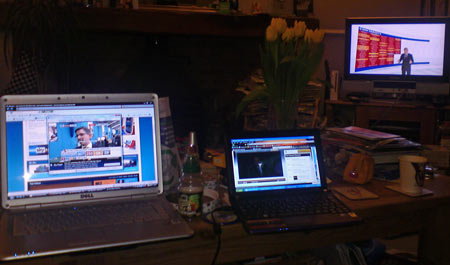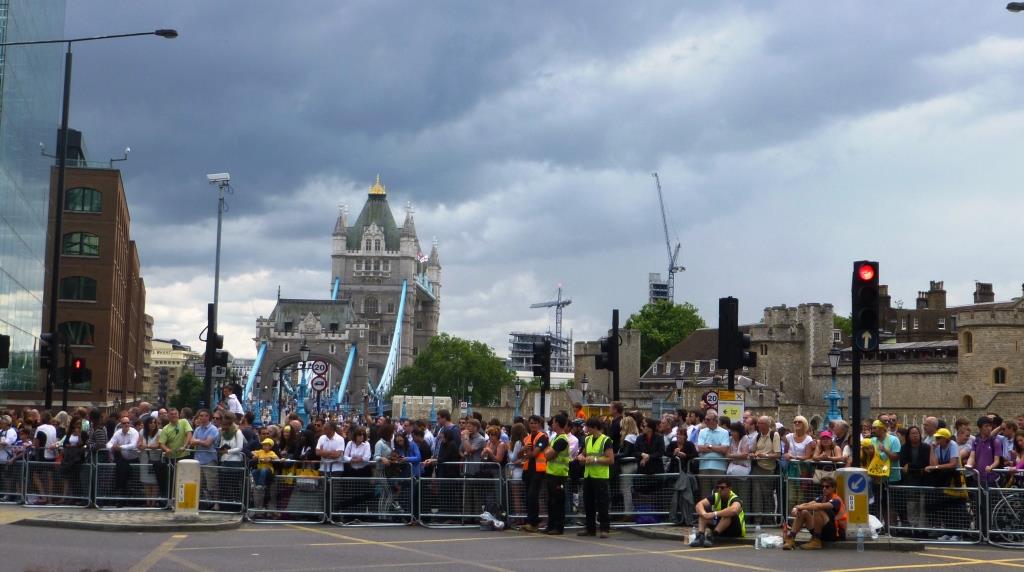
My novel is set partly in London (the City and über cool Shoreditch) where you only have to walk down the street or take a bus to realise there’s an abundance of non-native inhabitants.
And it doesn’t need a UKIP party political broadcast to point out that the recent changes in the population of London and the consequent changes in its character are particularly linked to rights of free movement within the European Union and its expansion eastwards.
One of my main characters, Kim, is a proud German but also an equally proud Londoner and thorough Anglophile — and she’s happy to live in cosmopolitan London indefinitely. It’s the hub of her world as an artist — but the price of living at the centre is the huge expense.
Kim goes to live in the countryside and her adjustment to life outside London — in a symbolic ‘green and pleasant land’ — unfolds as a significant element of the novel’s narrative. Unlike London, with its diverse neighbourhoods and coexisting communities, Kim has to gradually assimilate into a more closed, conservative and less fragmented community, which nonetheless already hosts a large number of immigrants.
The storyline may resonate with the inevitable debate about Britain’s relationship with Europe which will rumble on for the next few years — as whatever the outcome of the election Europe is bound to be a very hot topic.
Given that I’m rather sceptical about the supposed mood of Euroscepticism in the country, I was intrigued by the reception given to Le Grand Départ — the start of that most continental of events. Over the last weekend the Tour de France staged what was effectively a takeover of large parts of Yorkshire and it rode into London on Monday.
How would the supposedly Eurosceptic British react to an invasion of foreigners spearheaded by the oldest enemy of them all? We loved it.
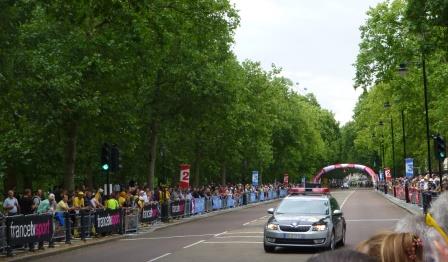
The road that connects Buckingham Palace with the Houses of Parliament — the axis of British government — was invaded on Monday by all things French — French TV cameras, banners in French, adverts for French supermarkets that we don’t even have in this country, the gendarmerie riding around London and even commentary in French relayed around the Mall and St. James’s Park. Surely this kind of thing would give Nigel Farage palpitations?
And the French invasion went right through London and beyond with the road to Tower Bridge sealed off because the French invasion procession was coming right past the Tower of London — look out for the crown jewels — and, as my photo shows, it caused huge disruption to the daily operation of the City of London.
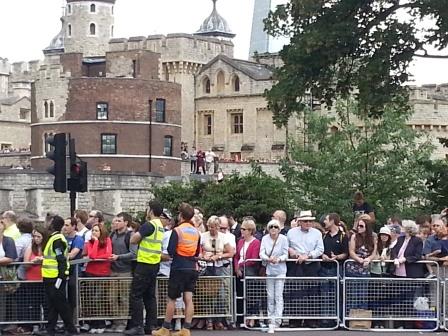
Were those entire Cities financial types w ho deserted their offices en masse at 3.15pm on a busy Monday heading to the barricades to remonstrate with meddlesome Europeans whose garlic-fuelled bike ride was interfering with the pinnacle of human endeavour — swapping money from one account to the next at the speed of light?
Perhaps Nigel preferred the Tour de France to the tur din România (and if you thought I Google translated that you’d be dead right) and the little Englanders might be relieved the whole moving carnival would soon be back in the land of hundreds of fromages (hang on, isn’t that us too these days?) .
But actually the hordes of City evacuees — and the many spectators from office windows — weren’t objecting to the French incursion — they were celebrating. Because, as the Olympics also showed two years ago, there’s nothing more the British like than to welcome the rest of the world and lay on a rather good party.
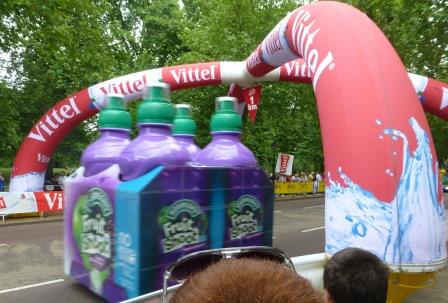
London often provides the backdrop to the historic and exotic but this Tour de France was inspired because it also visited one of the most diehard conservative realms of the national consciousness — Yorkshire. ‘There’s nowt about thy fancy foreign ways that impresses me.’ And I can say that without much fear of being accused of regional stereotyping because I was brought up about three miles from the route of Stage 2.
On Sunday the cyclists pedalled through the landscape of my formative years — the foothills of the Pennines. I used to frequently walk on the bleak moors that mark the Lancashire-Yorkshire border (the landscape that inspired the Brontës, Ted Hughes and Sylvia Plath amongst others) and the aerial views of the hills, valleys and reservoirs between Haworth, Hebden Bridge and Ripponden looked forbiddingly beautiful on television.
I would have loved to have travelled up north for the race. The atmosphere amongst the 10,000 people who lined the route in the mile or so of the race where the route crossed on to the Lancashire side looked incredible – and what might not have been obvious from the television pictures was that, as the main roads were closed all day, the vast majority of the spectators in this section had to walk or cycle three miles, involving a near thousand feet vertical climb from the valley below.
I came across some amazing photographs on Facebook of Carrefour floats and French motorcycling gendarmes passing flag-waving crowds on roads in places so inhospitable that there are no houses for several miles (and these photos had bikes on them unlike mine — which failed to capture any cyclists due to various camera disasters). The crowds gathered only a couple of miles away from some of the most notoriously desolate peat bogs on the Pennine Way.
The landlady of the White House Inn, on Blackstone Edge — one of only two dwellings along a five mile stretch of the A58, remarked that the visit of the Tour de France ‘made me proud to be British‘.
This isn’t as bizarrely contradictory as it sounds – welcoming visitors is something the British take pride in – and is at odds with the rhetoric of the isolationists and Eurosceptics.
My fictional idyllic village has made many foreign residents feel very welcome — American art lecturers, Polish cooks, Indian techies and so on — and they play a full part in English country life.
While the Tour de France was a novelty and a spectacle it still showed a desire to engage with Europe – and even better if it was also an exercise in the indulgence of another typical British trait — celebrating an excuse to get drunk.
The caravan that travelled through Yorkshire and into the heart of London was a peculiar celebration of French and Yorkshire promotions — big Visit Yorkshire floats, motorised Fruit Shoots and a speeding Carrefour mountain.
The whole spectacle showed how the British embraced a temporarily transplanted icon of Europe in a way that Jeremy Deller might describe as celebrating ‘Joy in People’ — even if they were mostly French and on bikes.

Do you think the Tour de France confounded the Eurosceptic stereotypes — I’d love to read any comments below.


